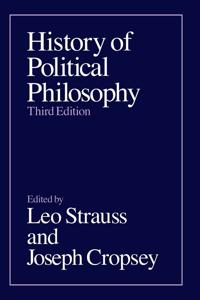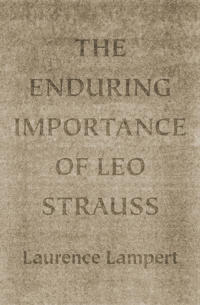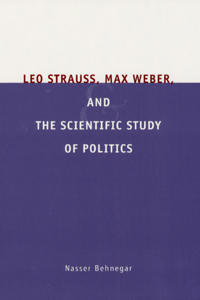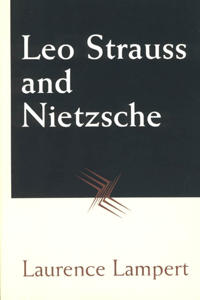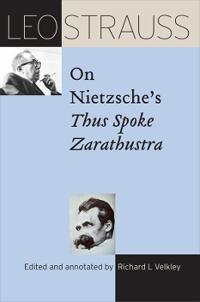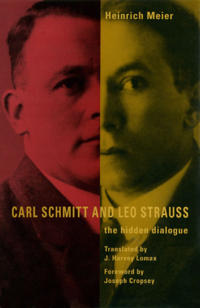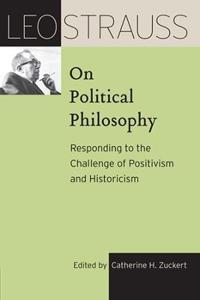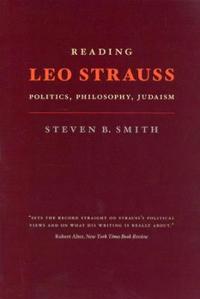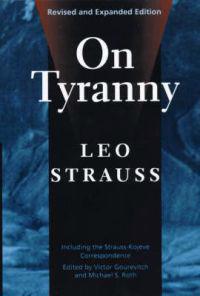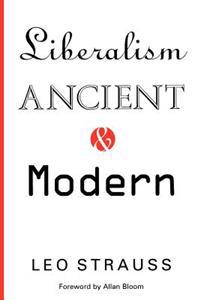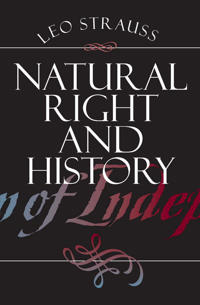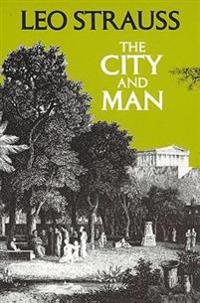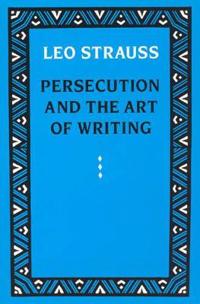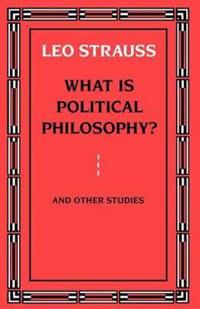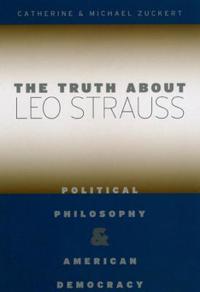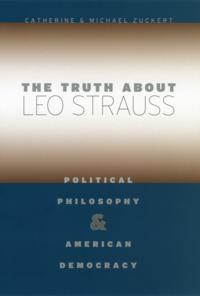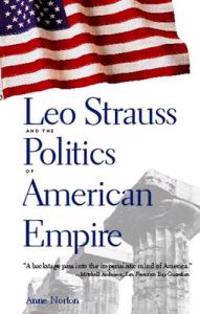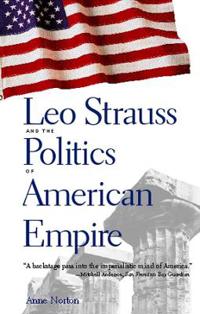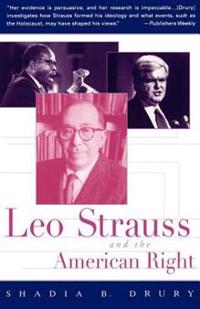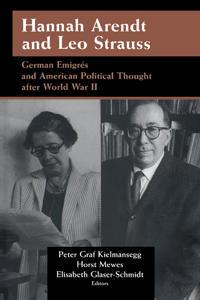History of Political Philosophy (Pocket)
avLeo Strauss, Joseph Cropsey, Leo Strauss
ISBN: 9780226777108 - UTGIVEN: 198711This volume provides an unequaled introduction to the thought of chief contributors to the Western tradition of political philosophy from classical Greek antiquity to the twentieth century. Written by specialists on the various philosophers, this third edition has been expanded significantly to incl[...]
The Enduring Importance of Leo Strauss (Inbunden)
avLaurence Lampert
ISBN: 9780226039480 - UTGIVEN: 201309In The Enduring Importance of Leo Strauss, Laurence Lampert takes on the crucial task of separating what is truly important in the work of Leo Strauss from the ephemeral politics associated with his school. Lampert focuses on exotericism - the use of artful rhetoric to simultaneously communicate a s[...]
Leo Strauss, Max Weber, and the Scientific Study of Politics (Pocket)
avNasser Behnegar
ISBN: 9780226041438 - UTGIVEN: 2005-07Almost three decades after Leo Strauss's death, Nasser Behnegar offers the first sustained exposition of what Strauss was best known for: his radical critique of contemporary social science - particularly of political science. Behnegar argues that Strauss was not averse to the scientific study of po[...]
Leo Strauss and the Problem of Political Philosophy (Inbunden)
avMichael P. Zuckert, Catherine H. Zuckert
ISBN: 9780226135731 - UTGIVEN: 2014-06-27Leo Strauss and Nietzsche
ISBN: 9780226468266 - UTGIVEN: 1997-12The political philosopher Leo Strauss has been credited by conservatives with the recovery of the great tradition of political philosophy stretching back to Plato. Strauss left a strongly negative assessment of Nietzsche as the modern philosopher most at odds with that tradition and most responsible[...]
Leo Strauss on Nietzsche's Thus Spoke Zarathustra
ISBN: 9780226486635 - UTGIVEN: 2017-12Although Leo Strauss published little on Nietzsche, his lectures and correspondence demonstrate a deep critical engagement with Nietzsche's thought. One of the richest contributions is a seminar on Nietzsche's Thus Spoke Zarathustra, taught in 1959 during Strauss's tenure at the University of Chicag[...]
Carl Schmitt And Leo Strauss
ISBN: 9780226518886 - UTGIVEN: 2006-11Carl Schmitt was the most famous and controversial defender of political theology in the twentieth century. But in his best-known work, "The Concept of the Political," issued in 1927, 1932, and 1933, political considerations led him to conceal the dependence of his political theory on his faith in d[...]
Leo Strauss on Political Philosophy: Responding to the Challenge of Positivism and Historicism
ISBN: 9780226566825 - UTGIVEN: 2018-07Leo Strauss is known primarily for reviving classical political philosophy through careful analyses of works by ancient thinkers. As with his published writings, Strauss's seminars devoted to specific philosophers were notoriously dense, accessible only to graduate students and scholars with a good [...]
Reading Leo Strauss
ISBN: 9780226763897 - UTGIVEN: 2007-04Interest in Leo Strauss is greater now than at any time since his death, mostly because of the purported link between his thought and the political movement known as neoconservatism. Steven B. Smith, though, surprisingly depicts Strauss not as the high priest of neoconservatism but as a friend of li[...]
On Tyranny (Pocket)
avLeo Strauss, Alexandre Kojeve, Victor Gourevitch
ISBN: 9780226776873 - UTGIVEN: 200005This work is Strauss' reading of Xenophon's dialogue, "Hiero" or "Tyrannicus", in which the tyrant Hiero and the poet Simonides discuss the advantages and disadvantages of exercising tyranny. This edition includes a translation of the dialogue, a critique of the commentary by the French philosopher [...]
Liberalism Ancient and Modern (Häftad)
avLeo Strauss, Allan David Bloom
ISBN: 9780226776897 - UTGIVEN: 199512Liberal democratic thought in the 20th century is composed of two strands: the classical, which emphasizes human excellence, and the modern, which emphasizes individual freedom and social equality. In these essays, Strauss examines the ambiguous relationship between these tendencies, seeking to illu[...]
Natural Right and History (Pocket)
avLeo Strauss
ISBN: 9780226776941 - UTGIVEN: 196510In this classic work, Leo Strauss examines the problem of natural right and argues that there is a firm foundation in reality for the distinction between right and wrong in ethics and politics. On the centenary of Strauss's birth, and the fiftieth anniversary of the Walgreen Lectures which spawned t[...]
The City and Man (Pocket)
avLeo Strauss
ISBN: 9780226777016 - UTGIVEN: 1978-11"The City and Man" consists of provocative essays by the late Leo Strauss on Aristotle's "Politics, " Plato's "Republic," and Thucydides' "Peloponnesian Wars." Together, the essays constitute a brilliant attempt to use classical political philosophy as a means of liberating modern political philosop[...]
Thoughts on Machiavelli (Häftad)
avLeo Strauss
ISBN: 9780226777023 - UTGIVEN: 1995-10Leo Strauss argued that the most visible fact about Machiavelli's doctrine is also the most useful one: Machiavelli seems to be a teacher of wickedness. Strauss sought to incorporate this idea in his interpretation without permitting it to overwhelm or exhaust his exegesis of "The Prince" and the "D[...]
Persecution and the Art of Writing (Häftad)
avLeo Strauss
ISBN: 9780226777115 - UTGIVEN: 1988-10The essays collected in "Persecution and the Art of Writing" all deal with one problem--the relation between philosophy and politics. Here, Strauss sets forth the thesis that many philosophers, especially political philosophers, have reacted to the threat of persecution by disguising their most cont[...]
What is Political Philosophy? (Häftad)
avLeo Strauss
ISBN: 9780226777139 - UTGIVEN: 198810"What is Political Philosphy?" - a collection of ten essays and lectures and sixteen book reviews written between 1943 and 1957 - contains some of Leo Strauss's most famous writings and some of his most explicit statements of the themes that made him famous. The title essay records Strauss's sole ex[...]
The Truth about Leo Strauss (Pocket)
avCatherine Zuckert, Michael Zuckert, Catherine Zuckert
ISBN: 9780226993331 - UTGIVEN: 2008-04Is Leo Strauss truly an intellectual forebear of neoconservatism and a powerful force in shaping Bush administration foreign policy? "The Truth about Leo Strauss" puts this question to rest, revealing for the first time how the popular media came to perpetuate an oversimplified view of a complex and[...]
Truth about Leo Strauss
ISBN: 9780226993348 - UTGIVEN: 2015-06Is Leo Strauss truly an intellectual forebear of neoconservatism and a powerful force in shaping Bush administration foreign policy? The Truth about Leo Strauss puts this question to rest, revealing for the first time how the popular media came to perpetuate such an oversimplified view of such a c[...]
Leo Strauss and the Politics of American Empire (Inbunden)
avAnne Norton
ISBN: 9780300104363 - UTGIVEN: 200410The teachings of political theorist Leo Strauss (1899-1973) have recently received new attention, as political observers have become aware of the influence Strauss's students have had in shaping conservative agendas of the Bush administration - including the war on Iraq. This provocative book examin[...]
Leo Strauss and the Politics of American Empire (Häftad)
avAnne Norton
ISBN: 9780300109733 - UTGIVEN: 200510The teachings of political theorist Leo Strauss (1899-1973) have recently received new attention, as political observers have become aware of the influence Strauss's students have had in shaping conservative agendas of the Bush administration--including the war on Iraq. This provocative book examine[...]
Leo Strauss (Häftad)
avDaniel Tanguay
ISBN: 9780300172102 - UTGIVEN: 2011-04Since political theorist Leo Strauss' death in 1973, American interpreters have heatedly debated his intellectual legacy. Daniel Tanguay recovers Strauss from the atmosphere of partisan debate that has dominated American journalistic, political, and academic discussions of his work. Tanguay offers i[...]
Leo Strauss and the American Right
ISBN: 9780312217839 - UTGIVEN: 1999-02In 1980 Ronald Reagan was elected President of the United States for his first term and the conservative revolution that was slowly developing in the United States finally emerged in full-throated roar. Who provoked the conservative revolution? Shadia Drury provides a fascinating answer to the quest[...]
Leo Strauss And The Invasion Of Iraq (Inbunden)
avAggie Hirst
ISBN: 9780415621625 - UTGIVEN: 2013-06-17"The political philosophy of Leo Strauss has been the subject of significant scholarly and media attention in recent years, particularly in the context of the decision to invade Iraq in 2003. During the period since then, questions have been raised regarding the influence of the works of Leo Strauss[...]
Hannah Arendt and Leo Strauss (Pocket)
avPeter Graf (EDT) Kielmansegg, Horst (EDT) Mewes, Elisabeth (EDT) Glaser-Schmidt
ISBN: 9780521599368 - UTGIVEN: 1997-07This volume on Hannah Arendt?s and Leo Strauss? impact on American political science after 1933 contains essays presented at an international conference held at the University of Colorado at Boulder in 1991. The book explores the influence that Arendt?s and Strauss? experiences of inter-war Germany [...]


